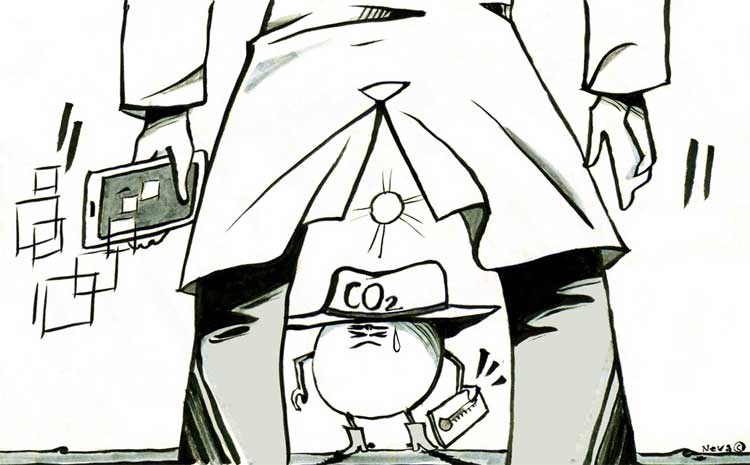The good news: in 2014 global greenhouse gas emissions apparently remained the same as in the previous year. The bad news: emissions have been growing over the course of past decades, at an increasing pace. The very bad news: climate change is caused by the sum of emissions over time. In order to stop it, we will need to become carbon neutral, sooner or later.
Climate change is one of great challenges of our times. Yet we seem to be unable to take action, or at least sufficient action. We blame the governments, the economy, the technology, the special interests. But we rarely blame ourselves. And for a simple reason. We can hardly see the carbon we generate. And yet we do produce carbon: 7 tons per capita in Europe and China, more than twice as much in the US.
Getting our economies to reduce emissions will require a major change, since energy is vital to everything we do. Technology will be an indispensable ingredient of this transition. And behavioural change will be too. Moreover, the two interact. As smart devices will become more and more common in our lives, so will be the potential for changing our behaviour by making it more sustainable. That’s why we need a better understanding of the impact of consumption on the environment, the ways in which sustainable behaviour and technologies can be promoted, and how this integrates with the traditional approaches to environmental policy making.
Think about energy efficiency. It is often in our own interest to be more efficient, plus it benefits the environment (and not only climate change, but all environmental problems). Nonetheless, improving energy efficiency has proven an elusive task. Standard economic instruments have yielded limited reductions. Regulatory engineering approaches have been equally problematic. And yet the potential for energy demand side management is enourmous, and increasing in importance. Is there a way we can harvest it? The aim of this research project is to shed light on these issues.
“Good luck with that! I know, but this what grants from the European Research Council are supposed to be, after all. Plus, it might be easier than you think.”
We know now much more about individual and social behaviour, thanks to the cumulative work of social psychology and more lately of behavioural economics. We have experience with public policy instruments for controlling the environment. And technology is changing too: going back to energy efficiency, in the EU alone 170 million smart meters are expected to be operational by the next two years. Smart thermostats for controlling your house temperature are now on the market. And so are LED lights, and social media devices.
Applying the tools of behavioural sciences and combining them with the numerical methods of big data analytics and integrated assessment modeling can yield important insights on how to influence behavioural change, technology adoption, and achieve more sustainability. It can also inform public policy making on what are the most efficient and effective tools to reduce emissions, energy consumption, local air pollution, water usage etc.
The project I am leading till 2017 – COBHAM – brings together a number of different disciplines which I hope will generate high quality research with repercussions on social welfare. The team I will be working with reflects this approach. Giovanna is a behavioural economist, Johannes a welfare economist. Giacomo is an integrated assessment modeler, while Mariaester and Jacopo will support me on the management and comunication side. Plus we are hiring (write me an email)!
Timely updates on research intermediary and final results will be posted on this website under the Stream section, where you will find also some interesting articles collected on the web, with a short comment from one of the team members.

